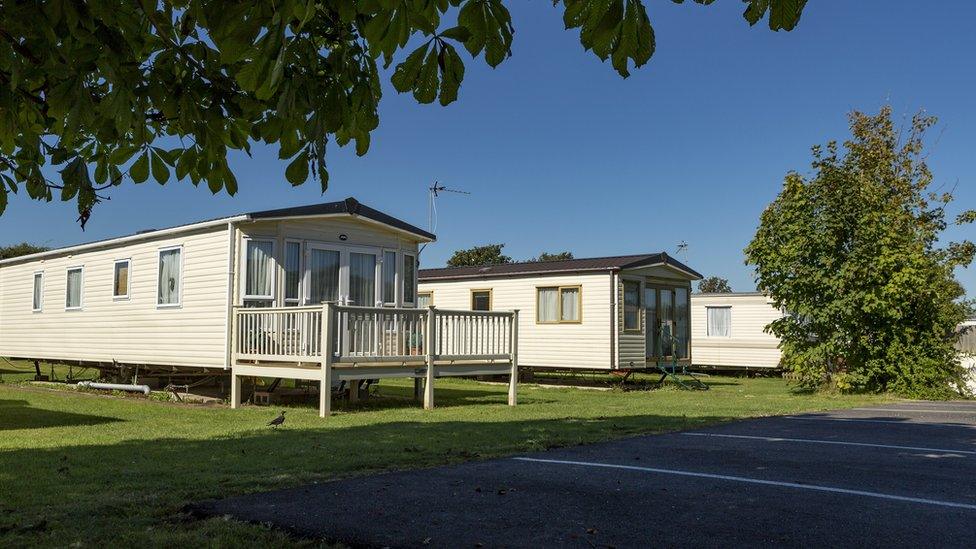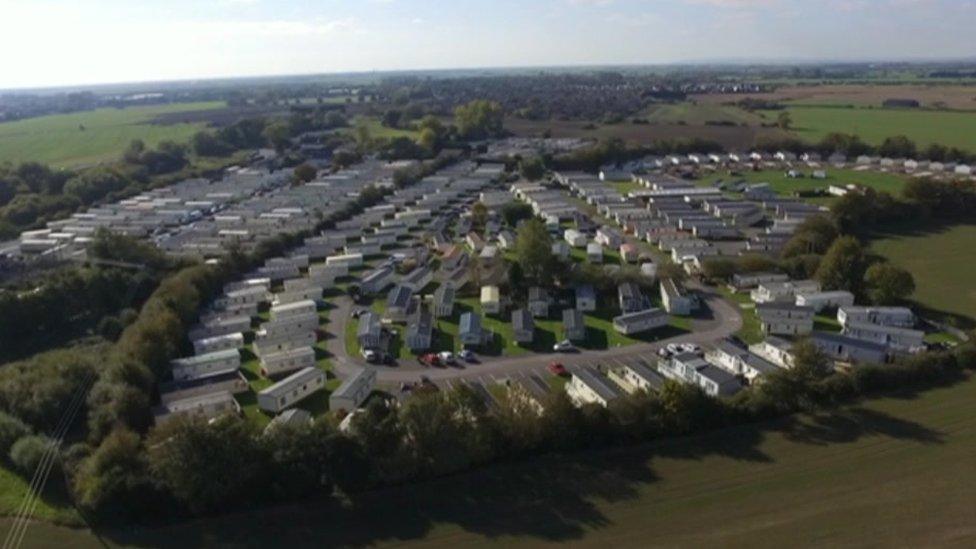One holiday park exposed trying to mis-sell caravans as homes
- Published

Caravans at Marlie Holiday Park in New Romney, Kent
A holiday park firm is facing allegations that 50 people are living unlawfully on sites in the South East.
The BBC filmed undercover at a Park Holidays site, where it was suggested to a potential "buyer" that caravans could be permanent homes - which would have been in breach of its own licence.
The firm said customers' contracts "unambiguously state" they could not be used "for residential purposes".
Buyers, it added, were told they must have a permanent address elsewhere.
Consumer rights lawyer Jane Sanders said: "I have 50 confirmed cases of people living on site in their caravans as their main residence, and I believe this is a huge problem - hundreds if not thousands of people living on these sites as their main residence."
She said many people were "terrified" to speak out about it, in case they were evicted.

Finance and consumer rights lawyer Jane Sanders said mis-selling caravans might become a national issue
Park Holidays has 29 parks across the country, and Ms Sanders is representing people living at sites in Kent and Sussex - including Marlie Holiday Park in New Romney, Kent, where the undercover footage was shot.
A BBC researcher, posing as a potential buyer without a permanent home, was told by staff at the firm that "it's almost like a residential park, although we've not got full residential status", and caravan owners can stay for eleven and half months with "no restrictions on usage".
The worker also advised the researcher to set up a PO Box for his post, and provide the company with a family member's address "for when my head office sends out rubbish about changing your caravan".
The staff member said there were only two weeks a year when caravan owners could not spend the night, and explained people often used those weeks to "see family, or go on holiday", as about 90% of owners "spend the full season here".

Marlie holiday park, where people claim they were mis-sold their caravans
Park Holidays UK said it "does not restrict the length of people's stays on site", but "if we suspect that the permitted use of the holiday home is being abused, we will investigate thoroughly... If misuse is found to be taking place we will, as a last resort, terminate the pitch licence agreement".
The spokesman added: "Staff receive comprehensive training which covers the requirement for them to explain to customers that holiday homes must not be used as permanent residences.
"Staff are also instructed not to sell to anyone if there is a concern that the would-be purchaser intends to define their holiday home as their primary residence, and failure to comply with this policy would be treated as gross misconduct."

You may also be interested in:

The firm said it obtained documentary proof that people had a permanent address elsewhere, but acknowledged that it had to accept this "in good faith", and a list of addresses was available for local authority to inspect.
In Kent, Folkestone and Hythe District Council stipulates that caravans cannot be "a person's sole or main place of residence" and said it was "worrying and disappointing to hear that buyers may be being misled".
Councillor Clive Goddard confirmed they carry out enforcement activities throughout the year to check that caravans are not being occupied as permanent residences, including visiting the parks during the times they are closed to check occupancy.
Caravan owner George Smith said he took his salesman "at his word" that he could live all year at the site, apart from for two weeks, and admitted not reading the contract in full.